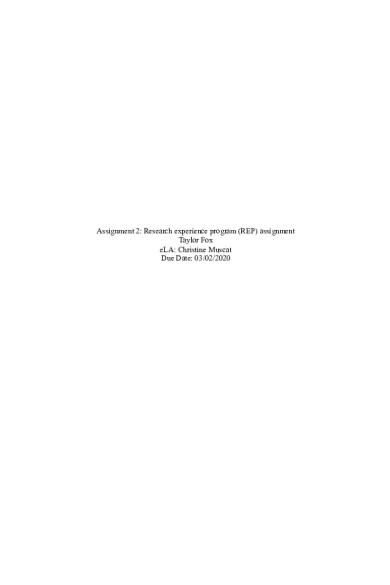Assignment 2- Research experience program (REP) assignment PDF

| Title | Assignment 2- Research experience program (REP) assignment |
|---|---|
| Author | Taylor Fox |
| Course | Introduction to Psychology 2 |
| Institution | Swinburne University of Technology |
| Pages | 6 |
| File Size | 291 KB |
| File Type | |
| Total Downloads | 43 |
| Total Views | 161 |
Summary
Download Assignment 2- Research experience program (REP) assignment PDF
Description
Assignment 2: Research experience program (REP) assignment Taylor Fox eLA: Christine Muscat Due Date: 03/02/2020
Research Experience Program Summary Table Ti t l e 1
2 3 4 5 6
Practice Study – Exploring the role of attitudes and cognition in toilet anxiety Thinking patterns and well-being Males only- An exploration of trauma and our inner world Practice Study – Mood and Food: how does diet impact your mood? Practice Study – Social attitudes survey An online survey exploring Schizotypal experiences in people without mental illness
Location
Number of credits 1
Online
0.5 1
Online Online
1
Online
0.5
Online
1
Online
Discussed in Essay (Y/N)
Yes
Yes
The first of two studies to be explored in this essay will be the study titled “An online survey exploring Schizotypal experiences in people without mental illness” (see Appendix A). The purpose behind this study was to investigate the existence and frequency of Schizotypal experiences in people that have not been diagnosed with any mental disorders. Schizotypal experiences can be described as unusual and strange experiences that are brief and vague with perceptual distortions. They encompass similar signs of schizophrenia but are typically less intense and less regular. Schizotypal experiences will also not interfere with the individuals daily functioning or cause distress. This study was completed online with questionnaires to assess an individual’s schizotypal experiences, personality and aspects of social adversity that they may encounter. The study used a correlation method to investigate the links between personality, social adversity and schizotypal occurrences. the questionnaires were designed to explore the relationship between people’s communication difficulty and their personality, social hardship and schizotypal experiences. This was done by seeing if you could predict someone’s scores on the communication difficulties questionnaire (Dependent Variable) by their scores on the other questionnaires assessing a variety of schizotypal experiences, social difficulties and personality (Predictor Variables). As no variable in this study have been controlled or manipulated by the experimenter there are no independent variables. This is a logical approach to take when exploring the relationship between difficulty in communicating and schizotypal episodes. As some schizotypal experiences have already been evaluated by using self-reporting questionnaires for several years already. Though debates have surrounded if this method could be used to evaluate other schizotypal experiences. The correlation method is especially effective when research is an infancy stage and is useful at gathering data quickly and efficiently on large scales. This gives researches an abundance of information to use as building blocks to further enhance future studies on the topic. Though this is when the weakness is also exposed as even when you can calculate the strength of the relationship between variables you cannot assume causation of the two. The sample used in this study was of online students and they were asked no demographical questions. this area could be approved upon so researches could see how people of different age, gender and ethnicity differed when it retained to schizotypal experiences. The second and closing study which we will be discussing in this essay will be the study named “Practice Study – Mood and Food: how does diet impact your mood?” (See Appendix B) The reason behind this study was to inspect whether the individuals participating who showed higher levels of trait vulnerability to Bipolar Disorder had diets which were high in inflammatory foods. This spawned from previous research linking people who have Bipolar Disorder were inclined to have poor diets that can lead to inflammation in the body. Prior research has also demonstrated that inflammation due to diet choices can lead to mood disturbances. This study involved an anonymous online survey which included questions on demographic, mood related traits, intake of food and present mood. The study also incorporated a cognitive test for attitude towards foods and preferences surrounding foods. No manipulation or controlling of variables where done in this study, meaning no independent variable was involved. leaving the predictor variable in this study to be level of trait vulnerability to Bipolar Disorder (low; high) type of diet (western = pro-inflammatory; traditional = neutral; Mediterranean = anti-inflammatory) and inherent preference for food (pro-inflammatory; anti-inflammatory). The outcome variable was mood as experienced over the past week (high; low). The method used seems to be a sensible approach to investigate
whether individuals who show any symptoms of trait vulnerability to Bipolar Disorder had a diet exposed with high inflammatory foods. The three diet types may have been a bit limiting in nature I think in further studies this could be increased to at least five dietary options. This would specify the diets to increase validity of the data without complicating it with too many categories. The addition of the cognitive test that demonstrated food preference was valuable as it showcased evidence as to which type of diet the participant craved without them thinking about answers for longer period that could lead them to answers that would be deemed more socially acceptable. A disadvantage of this study was the sample size. The sample was of Swinburne University students and does not represent the general population and conclusions will be limited due to this.
Appendix A Debrief Statement The questions included in this survey have assessed schizotypal experiences, some aspects of personality, and elements of social adversity. Schizotypal experiences are strange or unusual experiences that resemble the symptoms of schizophrenia, but are less intense, less frequent, and do not cause distress or interfere with a person’s everyday functioning. They have been reported by people who do not have diagnoses of mental illnesses, which has led some researchers to investigate whether they share the same causes as the symptoms of schizophrenia. Some schizotypal experiences, such as unusual perceptual distortions, have been assessed successfully using self-report questionnaires for a number of years. However, researchers have debated whether other schizotypal experiences, such as difficulties with keeping on topic during conversation, can be measured in this way. In this study, we used a questionnaire that specifically targets peoples’ experiences with communication difficulties. If this questionnaire measures an aspect of schizotypy, then we expect people who score highly on it to also score more highly on other schizotypy measures. At the same time, to check to see if this questionnaire isn’t just measuring an aspect of personality, like shyness, we have included some questions that assess these aspects of personality. Finally, people with schizophrenia often report experiencing social adversity. In this study, we are interested to see if people who have more schizotypal experiences also experience more social adversity. Thi si sanobs er v at i onal s t udyt ha thasbeendes i gnedt oex pl or ecor r el at i onal r el at i onshi ps ,r at her t hananex per i ment al st udyt hatex pl or escaus al r el at i onshi ps .Ass uch,t her ear enoi ndependent v ar i abl est hathav ebeenc ont r ol l edandmani pul at edbyt heex per i ment er .I ns t ead,t hemai npur pose oft hi sst udywast oexpl or ewhet herornotpeopl es ’ sc or esont hec ommuni c at i ondi fficul t i es ques t i onnai r e( i . e.t hedependentv ar i abl e)coul dbepr edi c t edbyt hei rs cor esonques t i onnai r es asses si ngot herf or msofs c hi z ot ypal exper i enc es ,s oci al adv er s i t y ,andper s onal i t y( i . e.t hepr edi ct or v ar i abl es) . Given the personal nature of the information that you have provided, we have not asked for any details that could be used to identify you, such as your name or date of birth. We will publish the results of this study in a group format that will further protect all participants from the possibility of being identified. These published results will be available for other researchers and clinicians to access so that they might further develop our understanding of schizotypal experiences. By taking part you have made an important contribution to this area. Note that schizotypy is considered to be part of the normal range of human experiences. The questionnaires you have completed are for scientific research, and do not represent a diagnosis of any mental health issues and/or symptoms. We hope that you have found your participation interesting but we do understand that some people may find these questions to be of a personal or sensitive nature, possibly causing discomfort or distress. If you have any questions or specific concerns about the study, please contact the research team: Chief investigator: Mr Philip Sumner; telephone: +61392148173; email: [email protected] If you prefer to deal with an external organisation and are located in Australia, you may contact: The Beyond Blue Support Service for 24/7 advice and support via telephone (1300 22 4636), daily web chat (3pm-12am), or email (response provided within 24 hours); or Lifeline Australia (13 11 14) for crisis support and suicide prevention. If you require immediate medical attention, you are encouraged to contact local emergency services. Thank you again for your participation.
Appendix B...
Similar Free PDFs

J2100 Research Assignment 2
- 4 Pages

Assignment 1 Purchase Experience
- 14 Pages

Program OF Studies Assignment
- 1 Pages

Research Outline - ASSIGNMENT
- 4 Pages

Assignment 1 research design
- 6 Pages

Admin Research Assignment
- 12 Pages

Assignment 1 - Research based
- 8 Pages

Market Research - Assignment 3
- 37 Pages

Research methodology assignment
- 10 Pages
Popular Institutions
- Tinajero National High School - Annex
- Politeknik Caltex Riau
- Yokohama City University
- SGT University
- University of Al-Qadisiyah
- Divine Word College of Vigan
- Techniek College Rotterdam
- Universidade de Santiago
- Universiti Teknologi MARA Cawangan Johor Kampus Pasir Gudang
- Poltekkes Kemenkes Yogyakarta
- Baguio City National High School
- Colegio san marcos
- preparatoria uno
- Centro de Bachillerato Tecnológico Industrial y de Servicios No. 107
- Dalian Maritime University
- Quang Trung Secondary School
- Colegio Tecnológico en Informática
- Corporación Regional de Educación Superior
- Grupo CEDVA
- Dar Al Uloom University
- Centro de Estudios Preuniversitarios de la Universidad Nacional de Ingeniería
- 上智大学
- Aakash International School, Nuna Majara
- San Felipe Neri Catholic School
- Kang Chiao International School - New Taipei City
- Misamis Occidental National High School
- Institución Educativa Escuela Normal Juan Ladrilleros
- Kolehiyo ng Pantukan
- Batanes State College
- Instituto Continental
- Sekolah Menengah Kejuruan Kesehatan Kaltara (Tarakan)
- Colegio de La Inmaculada Concepcion - Cebu






